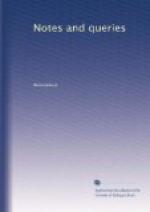* * * * *
PROVERBIAL SAYINGS AND THEIR ORIGINS—PLAGIARISMS
AND PARALLEL
PASSAGES.
In a note to Boswell’s Life of Johnson (Lond. 1816. 8vo.), iv. 196., the following lines are ascribed to their real authors:—
To Joh. Baptista Mantuanus (Leipz. 1511. 4to), Eclog. i.:—
“Id commune malum, semel insanivimus omnes.”
To Philippe Gaultier, who flourished in the last half of the 12th century (Lugduni, 1558. 4to. fol. xlij. recto):—
“Incidis in Scillam cupiens vitare Charybdim.”
At the conclusion of the same note, the authorship of
“Solamen miseris socios habuisse doloris,”
is said to remain undiscovered; but it appears to be a corrected form of a line in Albertus ab Eyb’s Margarita Poetica (Nuremberg, 1472. Fol.), where, with all its false quantities, it is ascribed to Ovid:—
“Solacium est miseris socios habere poenarum.”
Ovidius Epistolarum.
In the same page (fol. 149. rect.),
(sic) “Fecundi calices quem non fecere disertum”
is transferred from Horace to Ovid; while, on the reverse of the same fol., AEsop has the credit of
“Non bene pro toto libertas venditur
auro;
Hoc coeleste bonum praeterit orbis opes.”
Of the first line of the couplet, Menage says (Menagiana, Amstm. 1713. 12mo.), iii. 132., that it is “de la fable du 3’e Livre de ce meme Poete a qui nous avons dit qu’appartenoit le vers
“‘Alterius non sit qui suus esse potest;’”
But I cannot find the reference to which he alludes.
In the same fol. (149 rect.) is perhaps the earliest quotation of
“Gutta cavat lapidem non vi sed saepe cadende.—Sapiens,”
which occurs also in Menagiana (Amstm. 1713. 12mo.), i. 209.:—
“Horace fait mention
du Poete Cherile, de qui l’on n’a que ce
vers Grec—
“[Greek: Petran koilainei rhanis odatos endelecheiae.]”
“Gutta cavat lapidem non vi sed saepe cadendo.”
The parallel passages in Ovid are in Epist. ex Pont. iv. x. 5.:—
“Gutta cavat lapidem; consumitur
annulus usu,
Et feritur pressa vomer aduncus humo,”
and in Art. Amat. l. 475, 476.:—
“Quid magis est saxo durum? quid
mollius unda?
Dura tamen molli saxa cavantur aqua.”
F.C.B.
* * * * *
QUERIES.
A TREATISE ON THE LORD’S SUPPER, BY ROBERT CROWLEY.




